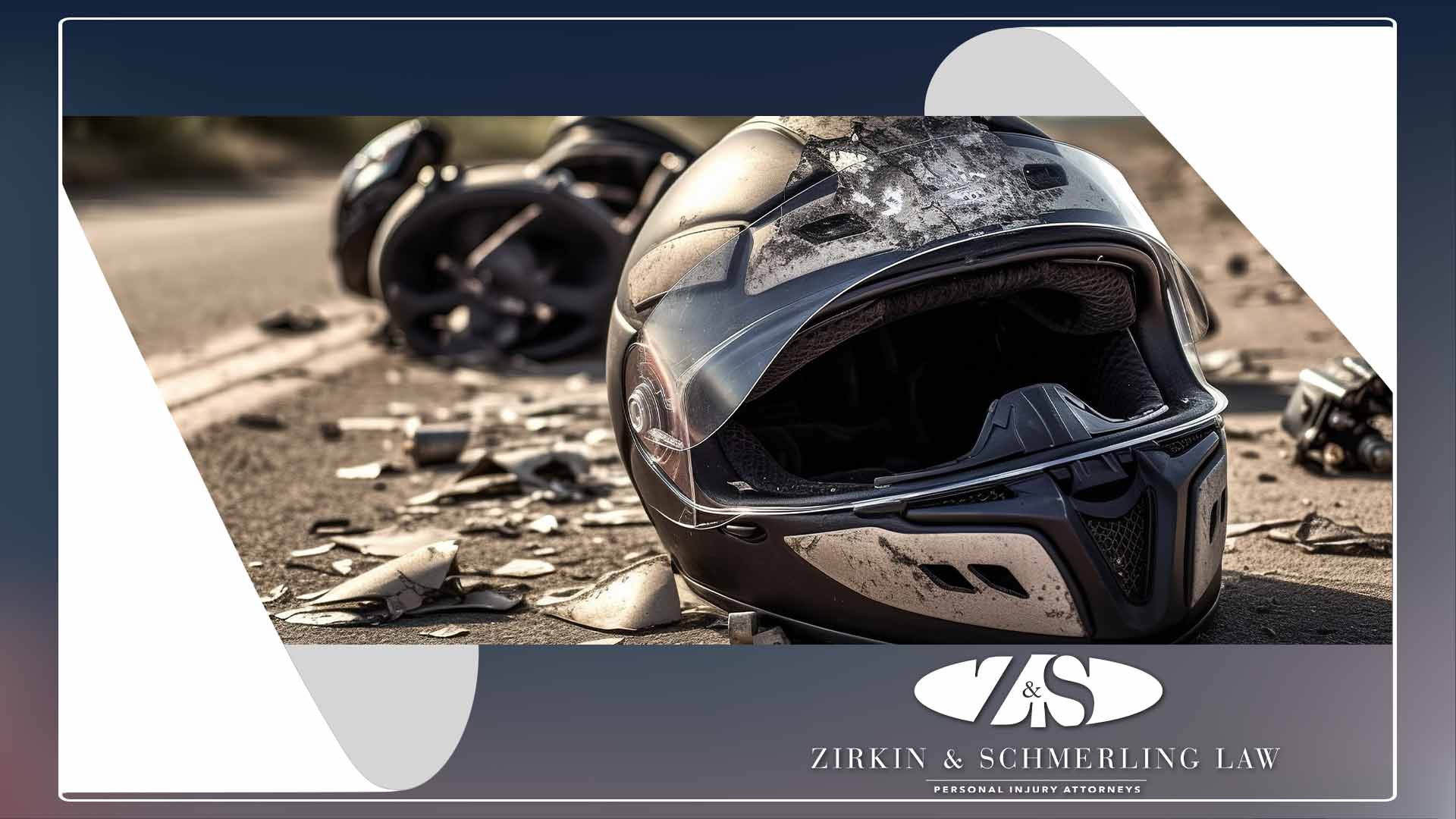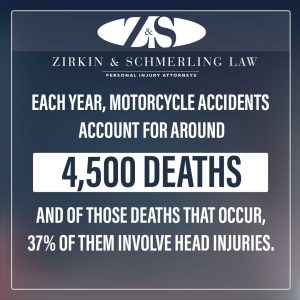

Motorcycle accidents account for 14% of all traffic fatalities each year, which comes out to around 4,500 deaths. And of those deaths that occur, 37% of them involve head injuries.
Even when a head injury in a motorcycle accident is not fatal, it can still lead to long-term complications. Head injury victims can suffer from debilitating symptoms, could require multiple surgeries, and they could even be left impaired or permanently disabled.
At Zirkin & Schmerling, we understand how devastating the aftermath of a motorcycle accident can be and are here to help. If you sustained a head injury in a Maryland motorcycle accident, such as a fractured skull, we can help you navigate the claims process and ensure you are fairly compensated for your pain and suffering.
What to Know About a Fractured Skull Head Injury After a Motorcycle Accident
Fractured skull injuries are often considered traumatic brain injuries because the impact is likely to not only have damaged the skull but the brain as well. These kinds of fractures include any kind of break to the cranial bone, and while some can heal without intervention, the victim could require surgery if brain damage also occurs.
Types of Skull Fractures
The specific type of fracture sustained in a motorcycle accident can vary depending on the location of the impact and the force of the blow. There are four primary types of skull fractures:
- Open fracture: This type of fracture occurs when the skin is broken open and parts of the bone are sticking out. This is also known as a compound fracture of the skull.
- Closed fracture: This type of fracture is simply a break that doesn’t result in the skin being broken open, thus the bone inside is not exposed.
- Basal fracture: This type of break occurs when there is a fracture in the floor of the skull. This includes the ears, nose, the areas around the eyes, and the area at the top of the neck.
- Depressed fracture: This type of fracture refers to damage trauma that causes the skull to indent. When this happens, the bone can extend into the brain activity.
Treatment for Skull Fractures
Before treatment, a doctor will need to order imaging tests to determine the severity and type of fracture sustained. This can also help determine whether brain damage also occurred in addition to the fracture. These kinds of tests can include X-rays, CT scans, and MRIs.
Once the damage is determined, the specific treatment plan will vary depending on how bad the damage is. A minor skull fracture, for example, can heal on its own and may only require over-the-counter medications to manage pain.
However, more severe skull fractures, which often occur in motorcycle accidents, may require more intensive treatments, like surgery. If brain damage occurs along with the skull fracture, the victim could need multiple surgeries and require long-term care, such as physical therapy.
Complications of Skull Fractures
Again, while a minor skull fracture isn’t likely to cause any long-term issues, a more severe fracture in addition to brain damage could lead to complications down the road. Many who suffer head injuries after a motorcycle accident are never the same and struggle with complications for the rest of their lives.
These types of injuries could affect a person’s ability to speak and think, their motor functions, their eyesight, and their ability to feel or sense things. It can even affect them psychologically and cause severe depression and anxiety.
Victims of head injuries that affect their brains can also suffer from seizures, blood clots, and strokes, and they may end up paralyzed. In the worst-case scenario, a head injury from a motorcycle accident can lead to brain damage and death.
How Do You Know If You Cracked Your Skull?
The only way to know for sure if you have suffered a skull fracture is to get examined by a doctor. If you hit your head in a motorcycle accident, you should always seek medical attention, even if you feel fine. Many head injuries do not show symptoms right away, but if you wait until symptoms do start to appear, it could be too late.
Some signs and symptoms that may indicate you sustained a skull fracture or any kind of head trauma can include:
- A bleeding head wound
- Bruising around the trauma site
- Severe pain around the impacted area
- Swelling and redness around the trauma site
- A headache that won’t go away
- Nausea and vomiting
- Blurred vision
- Loss of balance
- Loss of consciousness
- Excessive drowsiness
- Fainting
- Stiff neck
- Restlessness and irritability
Other Types of Head Injuries From Motorcycle Accidents
In addition to the skull fracture, other head injuries that you could also sustain in a motorcycle accident could include:
- Concussions
- Contusions
- Hematomas
- Coup-Contrecoup injuries
- Diffuse axonal injuries
Again, never assume that you are fine after hitting your head in a motorcycle accident. Just because there isn’t an open wound or obvious signs of pain doesn’t mean you didn’t sustain damage. Yes, a skull fracture could heal on its own, but if you have brain damage as well, the injury could be fatal if not treated in time.
Seeking Financial Compensation for a Fractured Skull Head Injury After a Motorcycle Accident
If you’ve sustained a head injury in a motorcycle accident, you may be entitled to compensation that can help you cover the losses you have experienced. Money from an accident claim can also compensate you for the pain and suffering you have experienced as a result of the accident and your injury.
However, to win your case you will need to provide evidence that proves what caused your injury, how bad the injury is, and how you have suffered as a result. This is typically best achieved by working with a lawyer. The insurance company will likely try to downplay your injury and get out of paying you what you are owed. A lawyer, however, can help you build a strong case with supporting evidence that ensures you are fully and fairly compensated.
The damages a lawyer can help you recover compensation for after a head injury in a motorcycle accident can include:
- Present and future medical bills
- Cost of therapy and rehabilitation
- Loss of income
- Loss of future earning potential
- Physical pain & suffering
- Emotional and psychological distress
- Loss of enjoyment of life
- Permanent impairment
- Disability
- Scarring and disfigurement
Have a Legal Question About a Head Injury Motorcycle Accident Case? We Have Answers.
At Zirkin and Schmerling Law, our team of Maryland motorcycle accident attorneys is dedicated to helping injured victims get the compensation they deserve. We have experience handling various kinds of cases, including those that lead to head and traumatic brain injuries, such as skull fractures. Contact us or call us at 410-753-4611 to set up an appointment with one of our attorneys today.
